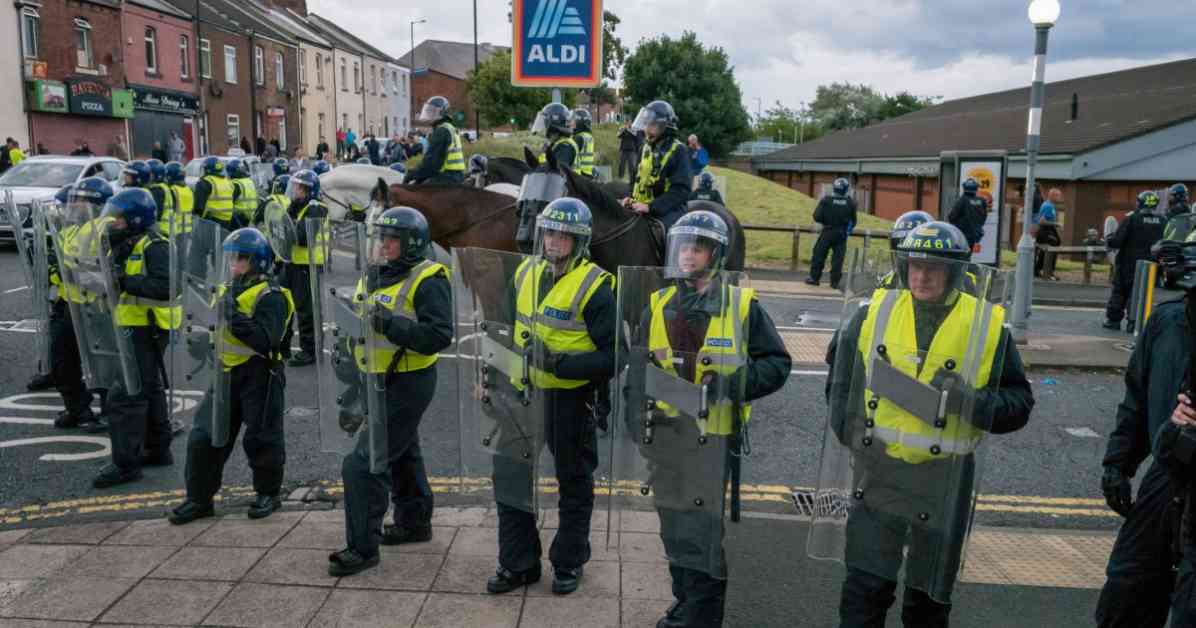A 15-year-old boy has made headlines as the first person to be charged with rioting in the UK following the recent violence that swept through various cities in the aftermath of the Southport stabbing attack. The teenager, whose identity remains undisclosed due to legal reasons, is set to appear at South Tyneside Youth Court to address the charges brought against him. This marks a significant development in the ongoing efforts to hold individuals accountable for their involvement in the riots that shook the nation.
The incident in question took place in Sunderland on August 2, where the accused teenager is alleged to have participated in the disorder that erupted in the city. While previous charges related to the riots have primarily been for violent disorder, which carries a maximum penalty of five years in prison, the charge of rioting carries a more severe punishment, with a potential sentence of up to ten years. This distinction underscores the gravity of the offense and the authorities’ determination to address such behavior with the utmost seriousness.
Assistant Chief Constable Alastair Simpson emphasized the significance of the charges, stating, “I hope this sends a really strong message that, no matter how old you are, if you took part in the recent appalling events in Sunderland, you will face really serious charges.” The swift action taken by law enforcement and criminal justice partners in apprehending those responsible for the riots demonstrates a commitment to upholding the rule of law and ensuring that individuals are held accountable for their actions.
Gale Gilchrist of the Crown Prosecution Service (CPS) acknowledged that more individuals are expected to be charged with rioting in the coming days as investigations progress. It is crucial for the public to refrain from engaging in any activities, such as sharing information online, that could prejudice the legal proceedings and impact the fairness of the trials. Maintaining the integrity of the judicial process is essential in delivering justice and upholding the principles of due process.
In response to the nationwide unrest that followed the Southport stabbing attack, the CPS has been considering introducing charges of rioting to address the widespread disorder and violence that occurred in various cities. Stephen Parkinson, head of the CPS, emphasized the importance of holding individuals accountable for their actions, stating, “We warned of the consequences and we will deliver these consequences. It’s not about exacting revenge, it’s about delivering justice.” This commitment to upholding the law and ensuring justice is served underscores the seriousness with which such offenses are being addressed.
The case of the 15-year-old boy facing charges for rioting serves as a stark reminder of the repercussions of engaging in violent and unlawful behavior. As the legal proceedings unfold, it is essential for all parties involved to adhere to the principles of fairness and due process to ensure that justice is served. The outcome of this case will undoubtedly have broader implications for how similar offenses are addressed in the future, highlighting the importance of upholding the rule of law and holding individuals accountable for their actions.
Challenges in Addressing Riots
Addressing riots and civil unrest poses significant challenges for law enforcement and the criminal justice system. The widespread nature of such incidents often makes it difficult to identify and apprehend all individuals involved, leading to delays in bringing perpetrators to justice. Additionally, the sheer scale of the violence and destruction that can occur during riots necessitates a coordinated response from multiple agencies to restore order and ensure public safety.
Legal Ramifications of Rioting
Rioting is a serious offense with severe legal consequences. In the UK, individuals convicted of rioting can face a maximum sentence of ten years in prison, highlighting the gravity of the offense. The distinction between rioting and other charges, such as violent disorder, reflects the heightened level of culpability associated with participating in a riot and the potential harm caused to individuals and communities.
Impact on Communities
The aftermath of riots can have lasting effects on communities, both socially and economically. The destruction of property, disruption of businesses, and harm to individuals can create long-term challenges for communities to overcome. Rebuilding trust, restoring order, and addressing the underlying issues that may have contributed to the unrest are critical steps in healing and moving forward after such events.
As the legal proceedings against the 15-year-old boy and potentially others involved in the riots continue, it is essential for the justice system to operate with transparency, fairness, and accountability. Upholding the rule of law and ensuring that individuals are held accountable for their actions is fundamental to maintaining the integrity of the legal system and promoting a sense of justice and security within society. The outcome of these cases will set a precedent for how similar offenses are addressed in the future, highlighting the importance of a swift and effective response to instances of civil unrest and violence.












